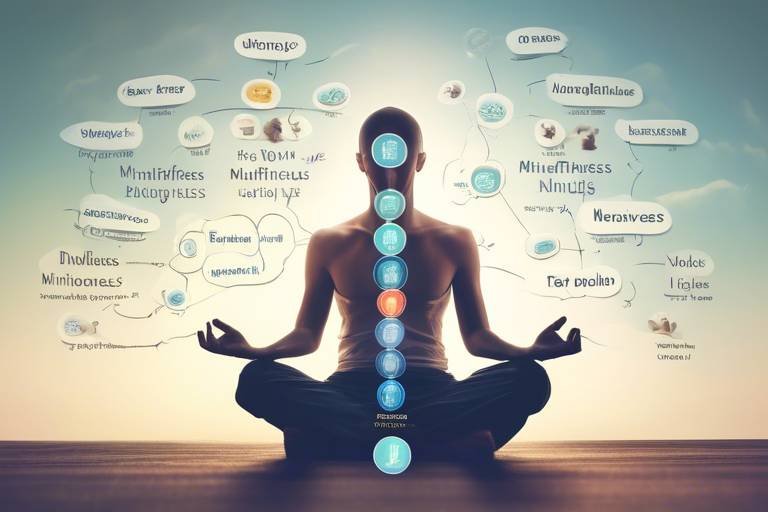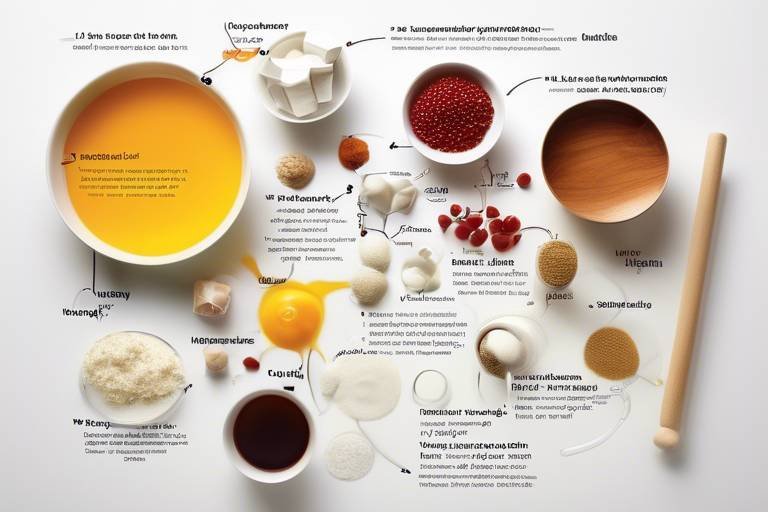The Science of Gratitude - Why It Matters
Gratitude is more than just a polite "thank you." It’s a powerful emotion that can transform our lives in profound ways. Imagine waking up each day with a heart full of appreciation, ready to tackle whatever challenges come your way. Sounds dreamy, right? Well, the science behind gratitude reveals that this feeling isn't just a fleeting moment; it has substantial psychological and physiological benefits that can enhance our overall well-being.
Research has shown that individuals who regularly practice gratitude tend to experience lower levels of depression and anxiety. They find joy in the little things and cultivate a mindset that fosters resilience. It’s almost like having a superpower! But how does this work? The answer lies in the intricate connection between our thoughts, emotions, and physical health.
When we express gratitude, whether through a simple acknowledgment or a heartfelt letter, we engage in a process that rewires our brain. This isn’t just fluff; studies have indicated that gratitude can lead to a series of changes in our brains that promote happiness and emotional stability. It’s as if we are training our minds to focus on the positive, which can drastically shift our perspective on life.
Furthermore, gratitude is a practice that anyone can adopt. It doesn’t require special skills or extensive knowledge; all it takes is a willingness to notice and appreciate the good around us. From appreciating a warm cup of coffee in the morning to cherishing moments with loved ones, every act of gratitude can contribute to a happier and healthier life.
In the following sections, we will delve deeper into the psychological and physiological benefits of gratitude, exploring how it influences our mental health, enhances our resilience, and even impacts our physical well-being. By the end, you’ll have practical tools to incorporate gratitude into your daily routine, paving the way for a more fulfilling and joyous life.
Understanding how gratitude impacts mental health can provide insights into its role in enhancing emotional resilience and overall happiness. Research shows that grateful individuals experience lower levels of depression and anxiety.
Gratitude not only affects the mind but also the body. Studies indicate that practicing gratitude can lead to improved sleep, reduced stress levels, and even lower blood pressure, showcasing its holistic benefits.
Exploring how gratitude influences brain chemistry reveals its role in boosting neurotransmitters like dopamine and serotonin, which are crucial for mood regulation and emotional well-being.
Dopamine, often termed the feel-good neurotransmitter, is significantly impacted by gratitude practices, enhancing feelings of pleasure and satisfaction in daily life.
Serotonin plays a vital role in mood stabilization, and gratitude can elevate its levels, contributing to a more positive outlook and emotional balance.
Cultivating gratitude can enhance resilience in the face of adversity. This section discusses how grateful individuals are better equipped to cope with challenges and setbacks.
Implementing gratitude practices into daily life can be transformative. This section outlines various methods, from journaling to mindfulness, to foster a grateful mindset.
Keeping a gratitude journal is a simple yet effective way to reflect on positive experiences and feelings, reinforcing a habit of appreciation and mindfulness.
Combining mindfulness with gratitude practices can deepen the experience, helping individuals to savor positive moments and cultivate a more appreciative perspective on life.
- What is gratitude? Gratitude is the feeling of appreciation or thanks, often expressed towards others or oneself.
- How can I practice gratitude daily? You can practice gratitude by keeping a journal, expressing thanks to others, or reflecting on positive experiences.
- What are the benefits of practicing gratitude? Practicing gratitude can lead to improved mental health, better sleep, reduced stress, and enhanced overall well-being.
- Can gratitude really change my life? Yes! Regularly practicing gratitude can shift your mindset, improve your relationships, and increase your happiness.

The Psychological Benefits of Gratitude
Understanding how gratitude impacts mental health can provide profound insights into its role in enhancing emotional resilience and overall happiness. When we express gratitude, we are not just acknowledging the good in our lives; we are actively rewiring our brains to focus on positivity. Research shows that individuals who practice gratitude experience significantly lower levels of depression and anxiety. It’s almost like flipping a switch in your mind, allowing the light of positivity to shine through the shadows of negativity.
Gratitude acts as a mental filter, helping us sift through the chaos of everyday life and focus on what truly matters. Think of it as a pair of glasses that allows you to see the beauty in the mundane. When you start to appreciate the small things—a warm cup of coffee in the morning, a smile from a stranger, or the sound of rain on your window—you begin to cultivate a mindset that is more resilient to stress and adversity. This shift in perspective can lead to a cascade of benefits that ripple through your mental health.
According to various studies, grateful individuals report feeling more optimistic about their lives and are more likely to engage in positive activities. Here are some key psychological benefits of gratitude:
- Enhanced Emotional Well-being: Grateful people tend to experience more positive emotions and less negative ones.
- Increased Life Satisfaction: A grateful mindset can significantly elevate your overall satisfaction with life.
- Better Coping Skills: Grateful individuals often have better coping mechanisms for dealing with stress and adversity.
Moreover, practicing gratitude has been linked to improved relationships. When we express appreciation to others, we strengthen social bonds and foster a sense of connection. This is crucial because social support is one of the most significant factors in maintaining mental health. As we express gratitude, we not only uplift ourselves but also those around us, creating a positive feedback loop that enhances our collective well-being.
In summary, the psychological benefits of gratitude are vast and impactful. By embracing gratitude, we can transform our mental landscape, leading to a happier, healthier life. It's not just about saying "thank you"; it’s about cultivating a mindset that actively seeks out the good, even in challenging times. So, why not start today? Take a moment to reflect on what you’re thankful for and notice how it shifts your mood and perspective.

The Physiological Effects of Gratitude
Gratitude is often perceived as a mere emotional response, but its impact stretches far beyond the mind, weaving a complex tapestry of physiological benefits that enhance our overall well-being. When we consciously practice gratitude, we activate a cascade of biological responses that can lead to significant improvements in our physical health. For instance, studies have shown that individuals who regularly express gratitude tend to experience better sleep quality, lower stress levels, and even reduced blood pressure. These findings highlight the profound connection between our emotional states and physical health.
One of the most compelling aspects of gratitude is its ability to influence our body's stress response. When we focus on what we are thankful for, we trigger the release of certain hormones that counteract the effects of stress. This process not only calms the mind but also reduces the strain on our cardiovascular system. Imagine gratitude as a soothing balm, gently easing the tension that builds up in our bodies during stressful times. The physiological effects are not just fleeting; they can lead to long-term health benefits.
Moreover, gratitude can significantly impact our immune system. Research indicates that individuals with a grateful mindset often have a more robust immune response, making them less susceptible to illnesses. This relationship between gratitude and health can be illustrated in the following table:
| Physiological Benefit | Impact of Gratitude |
|---|---|
| Improved Sleep Quality | Grateful individuals report fewer sleep disturbances and longer sleep duration. |
| Reduced Stress Levels | Practicing gratitude lowers cortisol levels, the hormone associated with stress. |
| Lower Blood Pressure | Gratitude has been linked to healthier blood pressure readings. |
| Enhanced Immune Function | Grateful people tend to have a stronger immune response. |
But how does this all work? The key lies in the brain's chemistry. When we practice gratitude, we stimulate the release of neurotransmitters that promote feelings of happiness and well-being. This not only elevates our mood but also encourages our body to function optimally. It's like giving your body a tune-up; gratitude helps keep everything running smoothly.
In summary, the physiological effects of gratitude are profound and multi-faceted. By fostering a grateful mindset, we can unlock a treasure trove of health benefits that enhance our physical well-being. So the next time you feel overwhelmed, take a moment to reflect on what you're grateful for—it might just be the best medicine you can give yourself.
- What are some simple ways to practice gratitude? You can start by keeping a gratitude journal, where you write down things you're thankful for each day.
- Can gratitude really improve my physical health? Yes, studies show that practicing gratitude can lead to better sleep, reduced stress, and improved immune function.
- How often should I practice gratitude? Incorporating gratitude into your daily routine, even for just a few minutes, can yield significant benefits.

Gratitude and Neurotransmitters
Have you ever noticed how a simple "thank you" can brighten your day? It’s not just a polite gesture; it’s a powerful tool that can fundamentally change the way our brains operate. When we practice gratitude, we’re not just acknowledging the good in our lives; we’re also engaging in a complex biochemical dance that involves neurotransmitters. These are the chemical messengers in our brain that play a crucial role in regulating mood, emotions, and overall mental health. Understanding how gratitude influences these neurotransmitters can give us a deeper appreciation for its significance in our daily lives.
One of the key players in this process is dopamine, often referred to as the “feel-good” neurotransmitter. When we express gratitude, our brain releases dopamine, creating feelings of pleasure and satisfaction. This is why doing something nice for someone else or simply reflecting on what we’re thankful for can lead to an instant boost in mood. Imagine dopamine as the spark that ignites joy within us; every time we acknowledge something positive, we fuel that spark, making it easier to find happiness even in challenging times.
Another critical neurotransmitter influenced by gratitude is serotonin. This chemical is vital for mood stabilization and emotional balance. Research has shown that practicing gratitude can elevate serotonin levels, leading to a more positive outlook on life. Think of serotonin as the stabilizing force in our emotional landscape. When we regularly engage in gratitude practices, we’re essentially reinforcing the pathways that promote feelings of well-being and contentment. This can be particularly beneficial during tough times when our mood may be more susceptible to fluctuations.
To illustrate the relationship between gratitude and neurotransmitter activity, consider the following table:
| Neurotransmitter | Role in Mood | Effect of Gratitude |
|---|---|---|
| Dopamine | Enhances feelings of pleasure and reward | Increased release during gratitude practices |
| Serotonin | Stabilizes mood and promotes emotional balance | Elevated levels lead to a more positive outlook |
In summary, the connection between gratitude and neurotransmitters is a fascinating aspect of our psychology. By consciously practicing gratitude, we not only improve our mental state but also engage in a biochemical process that promotes lasting happiness. So, the next time you take a moment to appreciate the good things in your life, remember that you’re doing more than just feeling good; you’re also enhancing your brain's chemistry for a brighter, more resilient future.
- What is gratitude? Gratitude is the practice of recognizing and appreciating the positive aspects of life, which can enhance emotional well-being.
- How does gratitude affect mental health? Practicing gratitude can reduce symptoms of depression and anxiety, leading to improved emotional resilience.
- Can gratitude improve physical health? Yes, studies suggest that gratitude can lead to better sleep, reduced stress levels, and lower blood pressure.
- What are some ways to practice gratitude? Keeping a gratitude journal, expressing thanks to others, and practicing mindfulness can all foster a grateful mindset.

The Role of Dopamine in Gratitude
Have you ever noticed how a simple "thank you" can light up someone's face? That warm glow isn't just a reflection of good manners; it's a biological response rooted in our brain's chemistry. Dopamine, often referred to as the "feel-good" neurotransmitter, plays a critical role in how we experience gratitude. When we express gratitude, our brains release dopamine, creating a sense of pleasure and satisfaction that can elevate our mood and enhance our overall well-being.
Imagine dopamine as a little cheerleader in your brain, celebrating every act of kindness or positive experience. This neurotransmitter not only makes us feel good but also encourages us to repeat the behaviors that brought about those feelings. So, when we practice gratitude, we're not just acknowledging the good in our lives; we're also training our brains to seek out more of those moments. It's a beautiful cycle: the more we express gratitude, the more dopamine we release, and the happier we feel.
Numerous studies have shown that individuals who regularly engage in gratitude practices report higher levels of happiness and life satisfaction. For instance, a study published in the journal Psychological Science found that participants who kept a gratitude journal experienced a significant increase in their overall well-being. This is largely due to the dopamine release associated with reflecting on positive experiences. The brain's reward system is activated, reinforcing the behavior of gratitude.
To illustrate the impact of dopamine on gratitude, consider the following table that summarizes key findings from various studies:
| Study | Findings |
|---|---|
| Psychological Science (2003) | Participants who practiced gratitude reported higher levels of happiness and lower levels of depression. |
| Journal of Happiness Studies (2007) | Gratitude journaling led to increased dopamine levels, enhancing overall mood. |
| Emotion (2010) | Gratitude was linked to greater life satisfaction and stronger social connections. |
In essence, dopamine acts as a catalyst for positive emotions, making gratitude not just a nice gesture but a powerful tool for emotional health. By cultivating a habit of gratitude, we can harness the power of dopamine to enrich our lives and foster a more positive outlook. So, the next time you feel grateful, remember that you're not just doing something nice for someone else; you're also giving your brain a little boost that can lead to lasting happiness.
- What is dopamine? Dopamine is a neurotransmitter that plays a key role in the brain's reward system, influencing feelings of pleasure and satisfaction.
- How does gratitude affect dopamine levels? Practicing gratitude stimulates the release of dopamine, enhancing feelings of happiness and well-being.
- Can gratitude improve mental health? Yes, gratitude has been shown to reduce symptoms of depression and anxiety while increasing overall life satisfaction.
- What are some ways to practice gratitude? Keeping a gratitude journal, expressing thanks to others, and mindfulness practices are effective methods to cultivate gratitude.

feel-good
This article explores the significance of gratitude, its psychological and physiological benefits, and practical ways to cultivate a grateful mindset for improved well-being and happiness.
Understanding how gratitude impacts mental health can provide insights into its role in enhancing emotional resilience and overall happiness. Research shows that grateful individuals experience lower levels of depression and anxiety.
Gratitude not only affects the mind but also the body. Studies indicate that practicing gratitude can lead to improved sleep, reduced stress levels, and even lower blood pressure, showcasing its holistic benefits.
Exploring how gratitude influences brain chemistry reveals its role in boosting neurotransmitters like dopamine and serotonin, which are crucial for mood regulation and emotional well-being.
Dopamine, often termed the neurotransmitter, is significantly impacted by gratitude practices, enhancing feelings of pleasure and satisfaction in daily life. When you express gratitude, your brain releases dopamine, which gives you that euphoric sensation—a bit like riding a roller coaster and feeling that rush of excitement. This chemical reaction not only uplifts your mood but also creates a positive feedback loop, encouraging you to seek out more joyful experiences and to appreciate the little things in life.
Serotonin plays a vital role in mood stabilization, and gratitude can elevate its levels, contributing to a more positive outlook and emotional balance. Think of serotonin as the sunlight that brightens your day; without it, everything feels a bit dimmer. By practicing gratitude, you're essentially allowing more sunshine into your emotional landscape, helping you to navigate life's ups and downs with greater ease.
Cultivating gratitude can enhance resilience in the face of adversity. This section discusses how grateful individuals are better equipped to cope with challenges and setbacks.
Implementing gratitude practices into daily life can be transformative. This section outlines various methods, from journaling to mindfulness, to foster a grateful mindset.
Keeping a gratitude journal is a simple yet effective way to reflect on positive experiences and feelings, reinforcing a habit of appreciation and mindfulness.
Combining mindfulness with gratitude practices can deepen the experience, helping individuals to savor positive moments and cultivate a more appreciative perspective on life.
- What is gratitude? Gratitude is the practice of recognizing and appreciating the positive aspects of life, whether big or small.
- How can gratitude improve mental health? Gratitude can reduce feelings of depression and anxiety, enhance emotional resilience, and promote overall happiness.
- Can gratitude affect physical health? Yes, practicing gratitude can lead to improved sleep, reduced stress levels, and lower blood pressure.
- What are some simple ways to practice gratitude? Keeping a gratitude journal, engaging in mindfulness, and expressing appreciation to others are great starting points.

neurotransmitter, is significantly impacted by gratitude practices, enhancing feelings of pleasure and satisfaction in daily life.
This article explores the significance of gratitude, its psychological and physiological benefits, and practical ways to cultivate a grateful mindset for improved well-being and happiness.
Understanding how gratitude impacts mental health can provide insights into its role in enhancing emotional resilience and overall happiness. Research shows that grateful individuals experience lower levels of depression and anxiety.
Gratitude not only affects the mind but also the body. Studies indicate that practicing gratitude can lead to improved sleep, reduced stress levels, and even lower blood pressure, showcasing its holistic benefits.
Exploring how gratitude influences brain chemistry reveals its role in boosting neurotransmitters like dopamine and serotonin, which are crucial for mood regulation and emotional well-being.
Dopamine, often termed the feel-good neurotransmitter, is significantly impacted by gratitude practices, enhancing feelings of pleasure and satisfaction in daily life. When we engage in activities that promote gratitude, such as reflecting on what we appreciate in our lives, our brains release dopamine. This neurotransmitter is responsible for the euphoric sensations we experience when we do something enjoyable, like eating our favorite food or achieving a personal goal.
Imagine your brain as a garden; every time you express gratitude, you're planting seeds that blossom into beautiful flowers of joy and satisfaction. The more you cultivate this garden, the richer the harvest of happiness you reap. Research has shown that individuals who regularly practice gratitude report higher levels of life satisfaction and overall well-being. It's like giving your brain a little boost of sunshine!
Serotonin plays a vital role in mood stabilization, and gratitude can elevate its levels, contributing to a more positive outlook and emotional balance. When we focus on the positive aspects of our lives and express appreciation, we are effectively signaling our brains to release more serotonin, which helps regulate mood and anxiety.
Cultivating gratitude can enhance resilience in the face of adversity. This section discusses how grateful individuals are better equipped to cope with challenges and setbacks.
Implementing gratitude practices into daily life can be transformative. This section outlines various methods, from journaling to mindfulness, to foster a grateful mindset.
Keeping a gratitude journal is a simple yet effective way to reflect on positive experiences and feelings, reinforcing a habit of appreciation and mindfulness.
Combining mindfulness with gratitude practices can deepen the experience, helping individuals to savor positive moments and cultivate a more appreciative perspective on life.
- What is gratitude? Gratitude is a feeling of appreciation for what one has, recognizing the positive aspects of life.
- How can I practice gratitude daily? You can practice gratitude by keeping a journal, expressing thanks to others, or simply reflecting on what you appreciate in your life.
- What are the benefits of practicing gratitude? Practicing gratitude can lead to improved mental health, better sleep, reduced stress, and enhanced emotional resilience.

The Impact of Serotonin on Mood
Serotonin, often referred to as the "happy hormone," plays a crucial role in regulating our mood and emotional well-being. When we think about gratitude, it’s fascinating to note how this simple yet profound practice can significantly influence serotonin levels in our brain. Imagine serotonin as a warm blanket on a chilly day; it wraps around us, providing comfort and stability in our emotional landscape. When we engage in activities that promote gratitude, we essentially boost our serotonin levels, paving the way for a more positive outlook on life.
Research indicates that individuals who regularly practice gratitude tend to experience higher levels of serotonin. This is not just a coincidence; it's a reflection of how interconnected our emotions and physiological responses are. When we express gratitude, whether through a simple thank-you or by acknowledging the good things in our lives, our brain responds by releasing serotonin. This biochemical reaction acts like a natural mood lifter, helping to combat feelings of sadness and anxiety.
Moreover, the relationship between gratitude and serotonin can be likened to a cycle. The more we practice gratitude, the more serotonin is released, leading to improved mood and emotional stability. In turn, when we feel better emotionally, we are more inclined to express gratitude, thus perpetuating this positive feedback loop. It’s like watering a plant; the more you nourish it, the more it flourishes.
It's essential to understand that serotonin does not work in isolation. It interacts with various neurotransmitters and hormones, creating a complex web of emotional regulation. For instance, a balanced serotonin level can mitigate the effects of stress hormones like cortisol, allowing us to approach challenges with a clearer mind and a more resilient spirit. This is particularly important in today’s fast-paced world, where stress can easily overwhelm us.
To visualize this, consider the following table that outlines the relationship between gratitude, serotonin levels, and mood enhancement:
| Gratitude Practice | Effect on Serotonin Levels | Impact on Mood |
|---|---|---|
| Daily Journaling | Increases | Enhances positivity and reduces anxiety |
| Expressing Thanks | Increases | Boosts overall happiness |
| Mindful Reflection | Increases | Promotes emotional balance |
In conclusion, the impact of serotonin on mood is profound, and gratitude acts as a catalyst for this transformation. By integrating gratitude into our daily lives, we not only foster a more positive mindset but also enhance our emotional resilience. So, the next time you feel overwhelmed, take a moment to reflect on what you’re grateful for; it might just be the boost your serotonin levels need to lift your spirits.
- What is serotonin? Serotonin is a neurotransmitter that helps regulate mood, sleep, and appetite.
- How does gratitude affect serotonin levels? Practicing gratitude can increase serotonin production, leading to improved mood and emotional stability.
- Can gratitude help with depression? Yes, studies suggest that gratitude practices can lower symptoms of depression and anxiety.
- What are some ways to practice gratitude? You can keep a gratitude journal, express thanks to others, or engage in mindfulness exercises focused on appreciation.

Gratitude and Resilience
Gratitude is not just a fleeting feeling; it's a powerful tool that can significantly enhance our resilience in the face of life's challenges. When we cultivate a sense of gratitude, we are essentially training our minds to focus on the positive aspects of our experiences, even amidst adversity. This shift in perspective can transform how we respond to stress, setbacks, and disappointments. Imagine standing in the midst of a storm, yet instead of focusing on the rain, you find joy in the rainbow that follows. This is the essence of gratitude—it allows us to see the beauty in our struggles.
Research has shown that individuals who practice gratitude regularly tend to bounce back from difficulties more effectively than those who do not. Grateful people are more likely to view challenges as opportunities for growth rather than insurmountable obstacles. They possess a unique mindset that enables them to maintain a sense of hope and optimism, which is crucial for resilience. When faced with a setback, a grateful individual might reflect on what they can learn from the situation, rather than dwelling on the negative aspects.
One fascinating aspect of gratitude is its ability to foster social connections, which are vital for resilience. When we express gratitude, we strengthen our relationships with others. These connections provide us with a support network during tough times. For instance, if you thank a friend for their support during a difficult period, you're not only acknowledging their help but also reinforcing the bond between you. This social support can be a lifeline, helping us to navigate through life's challenges.
To illustrate the impact of gratitude on resilience, consider the following table that highlights key benefits:
| Benefit | Description |
|---|---|
| Enhanced Perspective | Gratitude encourages a positive outlook, helping individuals see beyond immediate challenges. |
| Improved Coping Skills | Grateful individuals are better equipped to handle stress and adversity. |
| Stronger Relationships | Expressing gratitude fosters deeper connections with others, providing emotional support. |
| Increased Optimism | Gratitude helps maintain a hopeful attitude, which is essential for overcoming difficulties. |
Incorporating gratitude into our daily lives can be as simple as taking a moment each day to reflect on what we appreciate. Whether it's a kind gesture from a friend, a beautiful sunset, or even a small victory at work, acknowledging these moments can significantly bolster our resilience. So, the next time you face a challenge, ask yourself: What can I be grateful for in this situation? This simple question can shift your mindset and empower you to navigate through difficulties with grace and strength.
- How can I start practicing gratitude? You can start by keeping a gratitude journal, where you write down three things you are thankful for each day.
- Is gratitude linked to better mental health? Yes, numerous studies have shown that practicing gratitude can lead to lower levels of depression and anxiety.
- Can gratitude improve relationships? Absolutely! Expressing gratitude can strengthen bonds and improve communication with others.
- How often should I practice gratitude? It's beneficial to practice gratitude daily, even if it's just for a few moments.

Practical Ways to Practice Gratitude
Implementing gratitude practices into your daily routine can be a game-changer for your overall well-being. It's like adding a splash of color to a black-and-white picture; it brings vibrancy and depth to your life. The beauty of gratitude is that it doesn’t require a lot of time or effort, yet the rewards can be profound. So, how can you weave gratitude into the fabric of your everyday life? Let’s explore some practical methods that can help you cultivate a more grateful mindset.
One of the most effective ways to practice gratitude is through gratitude journaling. This simple yet powerful technique involves setting aside a few minutes each day to jot down things you are thankful for. It could be anything from the warm cup of coffee you had in the morning to the smile from a stranger on the street. By taking the time to reflect on these positive experiences, you reinforce a habit of appreciation. Over time, you might find that your focus shifts from what’s lacking in your life to what you already have, creating a more positive outlook.
Another fantastic method is to incorporate mindfulness into your gratitude practice. Mindfulness allows you to be present in the moment, fully experiencing life as it unfolds. When combined with gratitude, mindfulness can elevate your appreciation for both the small and significant moments. For instance, when you savor a meal, take a moment to acknowledge the effort that went into preparing it, from the farmers who grew the food to the cook who made it. This practice not only enhances your experience but also deepens your connection to the world around you.
If you’re looking for a more social approach, consider expressing your gratitude to others. This could be as simple as sending a heartfelt message or making a phone call to someone who has made a difference in your life. Sharing your appreciation not only strengthens your relationships but also boosts your mood. It’s like throwing a pebble into a pond; the ripples of positivity spread out, touching everyone involved.
Lastly, creating a gratitude jar can be a fun and interactive way to practice gratitude. Find a jar and some small pieces of paper. Each day, write down something you are grateful for and place it in the jar. Over time, you’ll accumulate a treasure trove of positivity. On days when you feel down, you can revisit these notes to remind yourself of all the good in your life.
To summarize, practicing gratitude can be as simple as keeping a journal, being mindful, expressing thanks to others, or creating a gratitude jar. Each of these methods serves as a gentle reminder of the beauty and abundance that surrounds us. By incorporating these practices into your daily life, you can foster a more grateful mindset, leading to improved happiness and well-being.
- What are the benefits of practicing gratitude? Practicing gratitude can enhance mental health, improve relationships, and increase overall happiness.
- How often should I practice gratitude? It’s beneficial to practice gratitude daily, even if it’s just for a few minutes.
- Can gratitude really change my perspective on life? Yes! Regularly practicing gratitude can shift your focus from what you lack to appreciating what you have.

Gratitude Journaling
Gratitude journaling is like a daily dose of positivity, a simple yet powerful practice that can transform your outlook on life. Imagine starting each day by reflecting on the things you appreciate—whether it's a warm cup of coffee, a friend's laughter, or even the beauty of a sunset. This practice not only encourages you to focus on the good but also helps you cultivate a habit of mindfulness and appreciation. By dedicating just a few minutes each day to jot down what you’re thankful for, you can significantly shift your mindset from one of scarcity to one of abundance.
So, how does gratitude journaling work its magic? It’s all about rewiring your brain. When you regularly acknowledge the positives in your life, your brain starts to look for more things to be grateful for. It’s like training a puppy; the more you reward it for good behavior, the more it wants to please you. Similarly, your brain begins to crave those feel-good moments, leading to an upward spiral of positivity. Studies have shown that individuals who engage in gratitude journaling report higher levels of happiness and lower levels of depression. This practice can be particularly beneficial during tough times, serving as a reminder of the silver linings amidst challenges.
To get started with gratitude journaling, consider these simple steps:
- Choose Your Medium: Whether you prefer a classic notebook, a digital app, or even a simple note on your phone, pick what feels comfortable for you.
- Set a Routine: Try to write in your journal at the same time each day—perhaps in the morning to kickstart your day or in the evening to reflect on the day's blessings.
- Be Specific: Instead of writing vague statements like “I’m grateful for my family,” dive deeper. Elaborate on why you’re grateful for them—perhaps it’s their support during a tough time or the joy they bring into your life.
- Reflect on Challenges: Don’t shy away from writing about difficult situations. Finding gratitude in adversity can be incredibly powerful and can help you grow.
As you continue this journey of gratitude journaling, you may notice a shift not only in your mood but also in your overall perspective on life. It’s a beautiful reminder that even on the hardest days, there’s always something to appreciate. So grab that pen or open that app, and start jotting down your blessings—your future self will thank you!
Q: How often should I write in my gratitude journal?
A: It's best to write daily, but even a few times a week can be beneficial. The key is consistency, so find a rhythm that works for you.
Q: What if I can't think of anything to write?
A: Start small! Focus on simple things like a good meal, a kind gesture from someone, or even a moment of peace. Over time, you'll find it easier to identify things to be grateful for.
Q: Can I share my gratitude journal with others?
A: Absolutely! Sharing your gratitude can enhance your connections with others and inspire them to start their own gratitude practices.

Mindfulness and Gratitude
When we think about mindfulness and gratitude, it’s like pairing two powerful forces that can transform our lives. Mindfulness, the practice of being present in the moment, allows us to fully experience our thoughts and feelings without judgment. On the other hand, gratitude encourages us to recognize and appreciate the good in our lives. Together, they create a beautiful synergy that can enhance our overall well-being.
Imagine walking through a serene forest. The chirping birds, the gentle rustle of leaves, and the fresh scent of pine envelop you. This is mindfulness. Now, think about how grateful you feel for that experience. You’re not just observing; you’re savoring it, soaking in the beauty, and appreciating every moment. This is where mindfulness and gratitude intersect, creating a rich tapestry of positive emotions.
Practicing mindfulness can significantly deepen our experience of gratitude. When we take the time to slow down and truly notice our surroundings, we become more aware of the little things that often go unnoticed. It’s easy to take for granted the warmth of the sun on our skin or the laughter of a loved one. However, when we practice mindfulness, we can transform these ordinary moments into extraordinary ones. This heightened awareness helps us cultivate a sense of appreciation that can lead to lasting happiness.
Research has shown that individuals who regularly practice mindfulness alongside gratitude report higher levels of emotional well-being. They are better equipped to handle stress and are more resilient in the face of adversity. By incorporating mindfulness into our gratitude practices, we can train our brains to focus on the positive, shifting our perspective from what we lack to what we have.
So, how can we effectively combine mindfulness and gratitude in our daily lives? Here are a few practical tips:
- Mindful Breathing: Take a few moments each day to focus on your breath. As you breathe in and out, think of something you are grateful for. This simple act can ground you and elevate your mood.
- Gratitude Meditation: Set aside time for meditation where you specifically focus on the things you appreciate in your life. Visualize each one and let the feelings of gratitude wash over you.
- Daily Reflection: At the end of each day, reflect on three things you are grateful for. Try to recall the details of each moment and how they made you feel.
By integrating these practices into your routine, you can create a habit that not only enhances your sense of gratitude but also cultivates a mindful approach to life. Remember, it’s not just about feeling grateful; it’s about experiencing gratitude fully and deeply.
In conclusion, the combination of mindfulness and gratitude is a powerful duo that can lead to profound changes in our mental and emotional health. By being present and appreciating the world around us, we can unlock a treasure trove of joy and contentment that is always available to us.
- What is the main benefit of combining mindfulness and gratitude? The main benefit is enhanced emotional well-being, leading to lower stress levels and increased resilience.
- How often should I practice mindfulness and gratitude? Regular practice is key; even a few minutes each day can make a significant difference.
- Can mindfulness and gratitude help with anxiety? Yes, both practices can help reduce anxiety by promoting a more positive outlook and reducing negative thought patterns.
Frequently Asked Questions
- What is gratitude and why is it important?
Gratitude is the feeling of appreciation for what we have, whether it's people, experiences, or things. It's important because it can significantly boost our mental health, leading to lower levels of depression and anxiety. When we focus on what we're thankful for, we shift our mindset towards positivity, which can enhance our overall well-being.
- How does gratitude affect mental health?
Research shows that practicing gratitude can lead to improved emotional resilience. Grateful individuals often report feeling happier and more satisfied with their lives. By recognizing and appreciating the good, we can mitigate negative feelings and enhance our emotional stability.
- Can gratitude improve physical health?
Absolutely! Studies indicate that gratitude can lead to better sleep, reduced stress, and even lower blood pressure. When we practice gratitude, our body responds positively, contributing to our overall physical health and vitality.
- What are some practical ways to practice gratitude?
There are many ways to cultivate gratitude in your daily life. Keeping a gratitude journal, where you write down things you're thankful for, is a great start. Additionally, mindfulness practices can help you savor positive moments and deepen your appreciation for life.
- How does gratitude influence neurotransmitters?
Gratitude plays a significant role in boosting neurotransmitters like dopamine and serotonin. These chemicals are crucial for mood regulation. When we practice gratitude, we can enhance our levels of these feel-good neurotransmitters, leading to a more positive outlook and emotional balance.
- Can gratitude help with resilience during tough times?
Yes! Cultivating gratitude can enhance our ability to cope with challenges and setbacks. Grateful individuals are often better equipped to navigate adversity, as they can focus on the positives even in difficult circumstances.



















